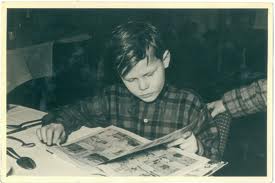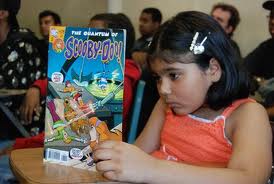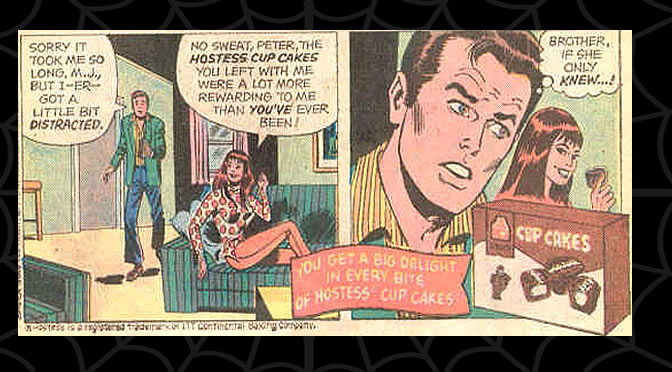 As I round out my first year as an educator, I feel like I must say some things in favor of children reading comics in order to further their education. This is, I know, a subject upon which many parties have disagreed, and the Crawl Space Podcast has highlighted the debate. I hope to, in as succinct an article as I know how, explain why comics equal a love for education.
As I round out my first year as an educator, I feel like I must say some things in favor of children reading comics in order to further their education. This is, I know, a subject upon which many parties have disagreed, and the Crawl Space Podcast has highlighted the debate. I hope to, in as succinct an article as I know how, explain why comics equal a love for education.
As an educator I have many goals, not the least of which are to help students love school and education (and thus become lifelong learners), and to make personal connections with students. As I quickly found out, one goes hand-in-hand with the other. A teacher’s ability to relate to students, or have a positive/mentoring relationship with students, will often impact the ability that that teacher has to foster a love of learning.
 I struggled with this idea of ‘personal relationships’ because I thought the line was too thin, and one could easily have a ‘friendship’ with the students. Yet while I stayed on the line of ‘teacher,’ I was told that I was too mechanical, and I did not offer enough of myself to the students. ‘They need to know a little about you; about who you are,’ I was told…what does that even mean? And what does this have to do with comics? Well, I am here to tell you that comics helped me bridge the gap between myself and the students, and made me more… ‘relatable.’
I struggled with this idea of ‘personal relationships’ because I thought the line was too thin, and one could easily have a ‘friendship’ with the students. Yet while I stayed on the line of ‘teacher,’ I was told that I was too mechanical, and I did not offer enough of myself to the students. ‘They need to know a little about you; about who you are,’ I was told…what does that even mean? And what does this have to do with comics? Well, I am here to tell you that comics helped me bridge the gap between myself and the students, and made me more… ‘relatable.’
The first sign of this came in mid-February, when I decided to have a break from a long 1.5 hours class and give a ‘Pop Quiz’ on superheroes. While many of the girls had no idea what was going on, the boys, for the first time, seemed excited and inquisitive. Even the girls joined in on the fun, though they produced the lower scores. From there I began introducing little pieces of the comic world into my classroom:
After a quiz or a test, I would show an episode of ‘Batman the Animated Series’ (that I could sometimes relate to Classics). This brought the class together (girls and guys), and brought me closer to the class. A poster of Batman, his rogues and allies, continually caused a group of students to circle around it and ask about the characters. A daily extra credit opportunity at the end of the year asked students to look up IGN’s Top 100 Superheroes. Students would ask me about past or upcoming superhero movies, and I would share with them my plans to see ‘Thor’ at midnight. This in turn allowed the students to come to me and discuss the movie outside of class, while even asking thought provoking questions like, ‘Would Thor beat Superman in a fight?’ I was even able to relate the death of Captain America to my AP Vergil class. While I certainly encouraged these discussions, I would in no way let these distract from my lessons. As with all things, there must be a proper balance.
The world of comics, while it may not pertain to everyone, certainly has the ability to open up avenues. Even now I think of conversations I may have had with strangers—people I may never have talked to, if not for comics.
 The second way that comics impact education is through literacy. English is still a weak subject for many people. As a Latin teacher, I sometimes have to teach English on top of the Latin. While comics are certainly no Charles Dickens or Charlotte Bronte, they do have the ability to get kids, students, to take time out of their day to read, where normally they would not pick up a book. Educators and parents know how important it is for children, everyone for that matter, to read at least 30 minutes a day. If you force a child to read a novel that means nothing to him or her, he or she will end up not enjoying the experience, or perhaps not get the full experience of the work. Now, if that child is able to choose, would he or she not be fulfilled?
The second way that comics impact education is through literacy. English is still a weak subject for many people. As a Latin teacher, I sometimes have to teach English on top of the Latin. While comics are certainly no Charles Dickens or Charlotte Bronte, they do have the ability to get kids, students, to take time out of their day to read, where normally they would not pick up a book. Educators and parents know how important it is for children, everyone for that matter, to read at least 30 minutes a day. If you force a child to read a novel that means nothing to him or her, he or she will end up not enjoying the experience, or perhaps not get the full experience of the work. Now, if that child is able to choose, would he or she not be fulfilled?
As the literature buff of the Crawl Space, I will not condone children ONLY reading comics, but I do think that it is a start. After all, if a child were to pick up ‘The Wizard of Oz’ published by Marvel Comics, do you not think that that very same child would become interested in the real thing? I think that comics are a gateway for many great things! One of my students actually asked me how I got into ‘all this superhero stuff,’ and I explained that this is what helped me start reading…and look at me now! We must also be aware of the types of comics out there. Of course I would encourage one of my students to pick up ‘Spider-Girl’…not ‘Punisher!’
I know that ‘comics’ is sometimes a dirty word, but I truly believe that there are some wonderful and positive aspects to these little illustrated books that many people ignore. They encourage reading without being obvious about it, and they do often have great characters that could serve as role models. On a more personal level, they continue the education process in subtle ways, and allow nervous first-year teachers to connect with students. While comics were not the ‘ice-breaker,’ (a story for another time, perhaps), they were the clippers that helped me cut down the teacher-student dividing-line slightly.
Ex animo,
Stella aka Spider-Girl







I agree that comics encourage literacy. They are a jumping on point to further reading. They were for me and I am continuing the tradition to reading comics as well as picture books to my toddler.
Great article Stella, I really liked it! Were there any instances where you used Spidey in a lesson?
Nice article Spider-Girl. Like George and Wheatcakes, I used to go look words up in the dictionary when I ran across one that I didn’t know. Comics were useful to me in that area.
Stella, you’ve raised some good points. Not only can comics actually help kids to read, but it can also help them somewhat identify with the real world (Spider-Man=the teenage years, X-Men=predjuice and understanding, Batman=coping with loss in a…positive way, I suppose, etc.)
Yes, I think comics can help in the classroom and SHOULD be used.
Awesome article! 🙂
Thanks for the great comments!
I didn’t get to learn to read using comics,since I preferred playing outside, but Archie Comics and some of the DCAU tie-ins helped me gain interest in reading, along with the Harry Potter books. Here I am now, several bookshelfs, dozens of novels, hundreds of comics later.
If only more teachers would do this…In my school, a teacher wanted to get students interested in Mythology, so he passed around Wonder Woman comics. Wish I was there at the time.
That was a very well-written article, Miss Stella. You always offer such clever and insightful opinions, and any student taken under your wing is in good hands.
I also picked up a dictionary from time to time because of comics, just like George.
Here’s a related story from Jim Shooter’s excellent blog: http://www.jimshooter.com/2011/03/diller-dollar-donald-duck-scholar.html
There’s a comment after it that made me chuckle, regarding Dr. Doom and an insolent cow.
I’m in high school right now (not literaly in the school but you know what i mean). Wish you were my teacher.
@AmFan… that’s awesome. Glad to see he got the W in that matchup. I bought the first season on DVD a whiles back and enjoyed every second of rewatching those episodes
Lots of good luck with that dear, I back you up
I love educators like you
@Brian Bradley: I used DW during season 1 of Fight Club, and won. (Check out FFFC #58 – “When Animals Attack”, too see how it went down, True Believer! 😉 )
http://spidermancrawlspace.com/wwwboard/viewtopic.php?f=20&t=7784
So yes, DW is a champion…not only of justice, but also in Fight Club. Feel free to use him as you will!
Do you know the difference between stalactites and stalagmites? Stalactites hang from the ceiling, while stalagmites rest on the ground. An easy way to remember is that the word “stalactites” has a “C” in it (for ceiling); The word “stalagmites” has a “G” (for ground).
I learned that from reading a comic book when I was little.
I may not remember much about science (it was always one of my weaker subjects), but I will never forget that.
I think comics are a great way for kids to learn…not just about reading, but they can also enhance vocabulary skills, and occasionally even teach little tidbits like that.
And Stella raises a good point about kids enjoying books they CHOOSE to read, versus ones they’re REQUIRED to read. My parents had to DRAG me to the library to get a book I was being forced to read…but I would gladly ride my bike 15 miles every week to my LCS to pick up new issues! And when my teachers MADE me read a book for a report or a test (The Adventures of Tom Sawyer, for example), I usually hated it, and was so bored and easily distracted that I couldn’t even remember half of what I had just read. However, I didn’t mind reading at all when they would give us a list of around 50 books, and let us CHOOSE 3 of them to report on. I chose to read The Hound of the Baskervilles, and I loved it so much I that I went back for more. To this day, Sir Arthur Conan Doyle is one of my favorite authors of all time.
Sounds like you’re doing a great job, Stella…Keep it up!
When I was young I read comics with a dictionary next to me so I could look up words I didn’t know. Especially if Reed Richards or Doctor Doom were involved. The first word I remember looking up because of a comic was ‘scruples,’ and that was thanks to G.I. Joe #1. I was ten years old and wanted to know what the hell Cobra Commander meant when he said he had none.
And I agree that it helps with grammar, spelling and sentence structure. Also creative thinking.
Nice insight, and I totally agree. I think comics are a great launching pad for young kids who are beginning to read… as long as its the right material. I remember reading all the Disney Adventure comics growing up and I would totally encourage any kid I had to read the Boom comics that Disney is putting out (even though I haven’t read them, they seem fun and Darkwing Duck is awesome… hmm, maybe Friendly Fire Fight Club worthy)
You teach latin? I assume you are a high school teacher then.